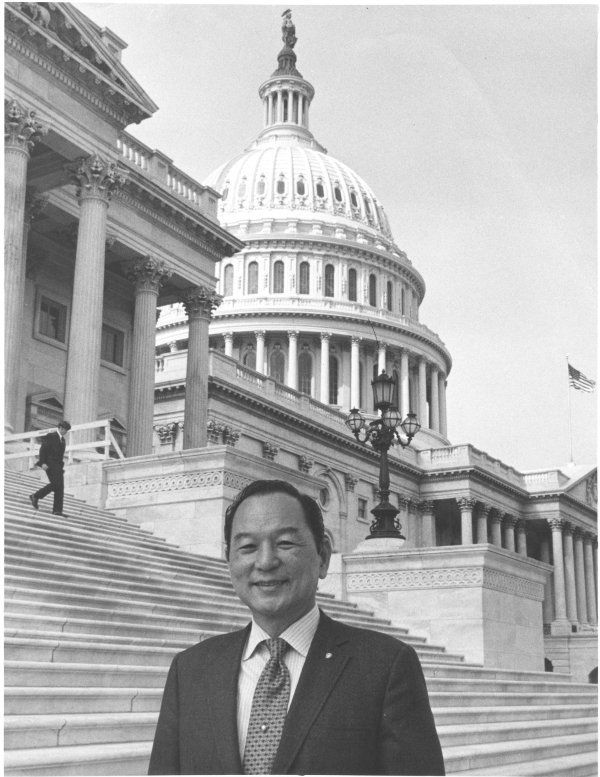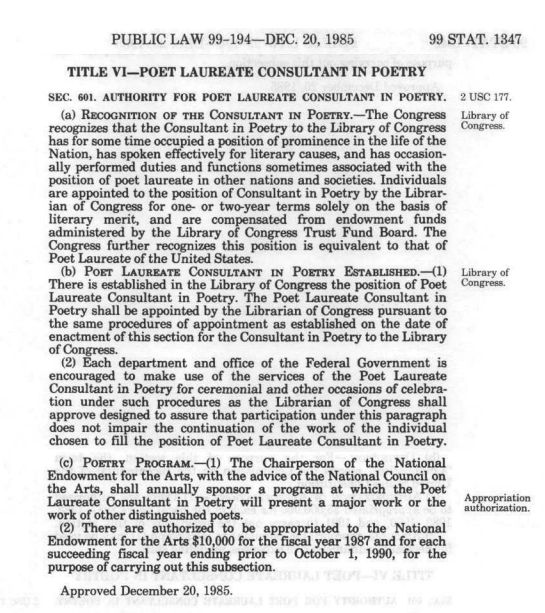
Photo courtesy of the U.S. Congress.
In 1963, a freshman congressman proposed legislation establishing a laureateship in poetry. The legislator, Spark M. Matsunaga, was the newly elected Democratic representative of the country’s newest state, Hawaii having achieved statehood only four years prior. Matsunaga was not successful that time. But he was tireless: for the next 22 years, Matsunaga would reintroduce the legislation in every session of Congress. When he won election to the Senate, he proposed the legislation there. The 22nd time was the charm.
On June 7, 1985, Matsunaga introduced Senate bill S.1264 with sponsorship by Senators Christopher Dodd (D-CT), Ted Kennedy (D-MA), Claiborne Pell (D-RI), Dan Quayle (R-IN), Paul Simon (D-IL), Robert Stafford (R-VT), Malcolm Wallop (R-WY), and Lowell Weicker (R-CT). Throughout the summer, the bill made its way through committees and subcommittees, where multiple hearings were held by the Senate Labor and Human Resources Subcommittee on Education, Arts, and Humanities. After the bill’s differences were resolved with the similar House bill H.R. 3248, “The Arts, Humanities, and Museums Amendments of 1985” sponsored by House Representative William D. Ford (D-MI), it finally went to the White House that December and signed into law as “Public Law 99-194” by President Ronald Reagan on December 20, 1985.

Matsunaga died on April 3, 1990 at the age of 73. A month later, Howard Nemerov‘s closing reading as Poet Laureate was dedicated to Matsunaga’s memory.
The Librarian of Congress James H. Billington opened the reading by honoring Matsunaga as the “author of the poet laureateship at this Library.” He eulogized Matsunaga thusly:
The major facts of Senator Matsunaga’s life are perhaps well-known. He was born in the Hawaiian territory to Japanese immigrant parents, graduated from the University of Hawaii and Harvard Law School before entering public life. In World War II he signed up for the 100th U.S. Infantry Battalion in Italy, which later became the much-decorated all-Nisei 442nd “Go For Broke” Regimental Combat Team. During this service he earned the Bronze Star and two Purple Hearts. Serving after the war as majority leader in the Hawaii Territorial House of Representatives, he was elected to Congress in 1962, won his Senate seat in 1970. Tributes to the Senator by his colleagues published in the Congressional Record refer again and again to at least three life goals towards which he worked untiringly as a legislator: reparations to Japanese Americans unjustly interned during World War II, the establishment of the U.S. Peace Institute, and the establishment at the Library of Congress of the post of Poet Laureate Consultant in Poetry. All three of these dreams he lived to see come true.
It was the late Senator’s legislation that set up this distinguished Laureateship and tonight’s poet is his third incumbant following Robert Penn Warren and Richard Wilbur. It has often been said that it is very much more difficult to write short than it is to ramble on in the longer form, so it’s good to know that Senator Matsunaga was fond of the haiku, a very short, graceful and rigorously disciplined Japanese verse form, and would on occasion write haiku himself. A tribute in the Honolulu Advertiser says “Poetry was one of his avocations. His tireless lobbying to create the post of Poet Laureate was regarded by some as an oddity, but he was dead serious in believing that a country ought to revere its literary artists and that poetry was a window to the soul.”
We are in his debt and the laureateship he worked so hard for provides an eloquent and growing memorial and the Library with its long tradition of consultantship is honored and moved to have this opportunity to pay grateful respect to the memory of the founder of the laureateship.
Dan Vera is the co-editor of the anthology Imaniman: Poets Writing in the Anzaldúan Borderlands (Aunt Lute Books, 2016), and author of two poetry collections: Speaking Wiri Wiri (Red Hen Press, 2013), and The Space Between Our Danger and Delight (Beothuk Books, 2008). Vera’s work is featured online at the Poetry Foundation website and in college and university curricula, various journals, and anthologies including Ghost Fishing: An Eco-Justice Anthology, the bilingual Al pie de la Casa Blanca/Knocking on the Door of The White House: Latino and Latina Poets in Washington, D.C., Queer South, Divining Divas, and Full Moon On K Street: Poems About Washington, DC. A CantoMundo and Macondo writing fellow, he’s a recipient of the Oscar Wilde Award for Poetry and the Letras Latinas/Red Hen Poetry Prize, as well as grants and fellowships from the DC Commission of the Arts & Humanities, the Humanities Council of Washington, DC, the Ragdale Foundation, and the Virginia Center for the Creative Arts. His other projects include the small literary presses Poetry Mutual and Souvenir Spoon Books, and co-curating the literary history website, DC Writers' Homes. Born and raised in South Texas, he lives in Washington, DC. For more visit http://www.danvera.com. To read more by Dan Vera: Dan Vera: Winter 2006; Dan Vera: Evolving City Issue; Dan Vera: Split This Rock Issue; Dan Vera's Introduction to the US Poets Laureate Issue,Fall 2009; Dan Vera: Langston Hughes Tribute Issue; Dan Vera: Floricanto Issue.